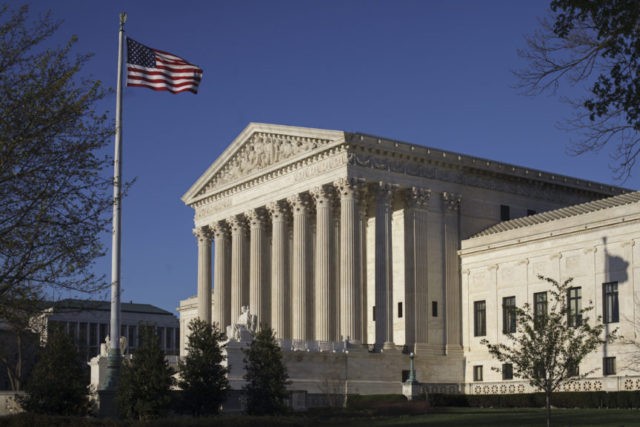WASHINGTON (AP) — The Latest on the Supreme Court consideration of a legislative redistricting case (all times local):
12:05 p.m.
Wisconsin Attorney General Brad Schimel (SHIH’-mehl) is praising the Supreme Court’s decision to put on hold an earlier ruling that new legislative maps be drawn.
The court on Monday stayed a ruling requiring the Republican-controlled Legislature to draw new maps by November. The court also announced it will hear arguments in the case brought by Democrats challenging the constitutionality of the existing maps.
Schimel says the stay “preserves the Legislature’s time, effort and resources while this case is pending.”
Campaign Legal Center attorney Paul Smith is the lead lawyer in the case challenging the maps. Smith says the court can decide the case in time for new maps to be drawn for the 2018 fall election.
___
11:40 a.m.
Wisconsin Gov. Scott Walker remains confident that GOP-drawn legislative district maps will survive a Supreme Court review.
The nation’s highest court on Monday said it will hear arguments in the case. Justices also put on hold an earlier ruling requiring that new maps be drawn by November.
Walker spokesman Tom Evenson says the Republican governor “is confident Wisconsin’s redistricting process is constitutional and is pleased to see the Supreme Court take the case.”
Democratic state legislative leaders say they have faith that the Supreme Court will uphold lower court rulings that found the maps unconstitutionally favored Republicans.
Democratic state Assembly leader Peter Barca says “Voters should be able to choose their representatives, not the other way around.”
___
11:25 a.m.
Wisconsin Attorney General Brad Schimel (SHIH’-mehl) says he is “thrilled” the Supreme Court will hear arguments in a lawsuit brought by Democrats challenging redistricting maps drawn by Republicans.
A panel of three federal judges previously ruled that the maps unconstitutionally harmed Democrats because districts were drawn in a way that unfairly benefited Republicans.
Schimel is a Republican who is defending the maps. He said on Monday that Wisconsin’s “redistricting process was entirely lawful and constitutional, and the district court should be reversed.”
Sachin Chheda (SAH’-chihn CHAY’-dah) is director of the Fair Elections Project, which organized and launched the lawsuit. He says Democrats proved in court that their rights were violated and “now this story will be told on a national stage.
___
11:15 a.m.
The Supreme Court is putting the redrawing of Wisconsin legislative districts on hold while the justices consider the issue of partisan gerrymandering.
The justices issued their order Monday about 90 minutes after they agreed to hear the Wisconsin case in the fall, the first case on partisan politics and redistricting in more than a decade.
The court’s five conservative justices voted to stop the redistricting process. The four liberals would have let it proceed.
A three-judge court struck down the districts as an illegal partisan gerrymander and ordered new ones to be put in place for the 2018 elections.
The Supreme Court is unlikely to decide the Wisconsin case before early next year.
___
9:30 a.m.
The Supreme Court is wading into the thicket of partisan redistricting in a case from Wisconsin.
The justices say Monday they will decide whether Republican lawmakers drew electoral districts so out of whack with the state’s political breakdown that they violated the constitutional rights of Democratic voters.
It’s the high court’s first case on what’s known as partisan gerrymandering in more than a decade, and the outcome could affect elections across the country.
The case will be argued in the fall.
A three-judge court struck down Wisconsin’s legislative districts in November and ordered new maps drawn in time for the 2018 elections. That work is proceeding.
___
3:15 a.m.
The Supreme Court could soon decide whether the drawing of electoral districts can be too political.
A dispute over Wisconsin’s Republican-drawn boundaries for the state legislature offers Democrats some hope of cutting into GOP electoral majorities across the United States. Election law experts say the case is the best chance yet for the high court to put limits on what lawmakers may do to gain a partisan advantage in creating political district maps.
The justices could say as early as Monday whether they will intervene. The Constitution requires states to redo their political maps to reflect population changes identified in the once-a-decade census.
The issue of gerrymandering — creating districts that often are oddly shaped, with the aim of benefiting one party — is central to the debate.
.

COMMENTS
Please let us know if you're having issues with commenting.